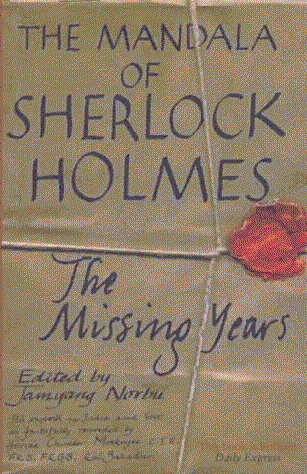|
|
|
The Mandala of Sherlock Holmes - The Missing Years
Edited by Jamyang Norbuone
John Murray £9.99 |

|
Reviewed by Ayo Onatade |
 |
I have always been wary
about pastiches,especially the one's based on Sherlock Holmes
and have often wondered whether or not the authors have managed
to retain that unique characterisation that made readers love
the originals and see them as classics.
The Mandala of Sherlock Holmes is
based on the two years that Sherlock Holmes spent in Tibet. It
was in 1891 that the British readers were informed that Sherlock
Holmes had perished at the Reichenbach Falls in Switzerland
after a struggle with his arch enemy Professor Moriarty. By
great popular demand two years later Conan Doyle resurrected
Holmes; who goes on to inform a stunned Dr Watson where he had
been the last two years. Everybody knows about Sherlock Holmes
journey to the East but no one really knew who his travelling
companion was at the time. After years of research by Tibetan "Baker
Street Irregular" Jamyang Norbu reveals that the wily
Bengali scholar and spy, Hurree Chunder Mookerjee from the
Rudyard Kipling masterpiece Kim was in fact Holmes' travelling
companion. Unknown to Watson he has been reading about the
exploits of his friend Holmes in the newspapers under the guise
of Norwegian explorer, Sigerson.
A Norwegian named Sigerson lands at
Bombay's Sassoon docks, and is greeted by Mookerjee, who is
investigating Holmes for his department. Not long after Holmes'
arrival at the Taj Mahal Hotel, there is a bloody murder in his
room, an attack originally intended for him. Laced with
fascinating esoterica and tantric trivia, the reader is led on
the trail of the assailant, whom Holmes suspects is an envoy of
the late professor. The trip leads him to Simla en route to
Lhasa, where he is sucked into a conspiracy to kill the Dalai
Lama by Chinese imperials. It is now Holmes' onus to protect the
14-year-old god-king and wipe out the vengeful Moriarty, who
returns with strange occult powers. This is certainly a good
angle, There are those two missing years, a period where
according to Holmes he not only visited the forbidden city of
Lhasa, but was the first European to do so. As far as I am aware
this is the first time this period in Holmes's life has been
covered.
Here we have a work of fiction which
reveals the secret of Holmes's missing years in India and Tibet.
Mandala strongly reminds the reader of Kipling's India with
Tibetan mythology mixed in. The basic premise of this book is to
let followers of Holmes know what exactly happened during his
visit to Tibet during the two years Doyle stopped writing the
Sherlock Holmes stories. However, this book also has a strong
religious and political statement, one which for me personally
marred the story. This is supposed to be a work of fiction not a
political playground. To give the author credit, one hole he did
not fall into like a number of the other pastiches is by making
Watson the narrator.
For some lovers of Sherlock Holmes
pastiches this might be a welcome addition to the series. I, on
the other hand, was not that impressed and felt very let down.
This book came across more like a supernatural thriller (think
X- Files) especially towards the end, than the story of Sherlock
Holmes's years in Tibet which is a shame. I enjoyed the first
half of the book but certainly found the second half just didn't
work, and under any other circumstances I would not have read
this book.
 |
|
|